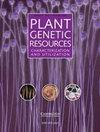丹参3-羟基3-甲基戊二酰辅酶a还原酶基因(SmHMGR)的遗传多样性及系统发育分析
IF 0.7
4区 生物学
Q3 PLANT SCIENCES
Plant Genetic Resources: Characterization and Utilization
Pub Date : 2022-05-18
DOI:10.1017/s1479262122000120
引用次数: 0
摘要
HMGR(3-羟基-3-甲基戊二酰辅酶a还原酶)是中药丹参中异戊二烯类化合物及其后丹参酮生物合成的甲羟戊酸(MVA)途径的主要限制性酶,主要用于心血管疾病。本文首次对国内38个丹参栽培居群的SmHMGR基因进行了基因组测序,揭示了其遗传多样性和系统发育。SmHMGR基因不含内含子,全长1650~1659 bp,多数为1656 bp,两个独特群体W-FJLY-V-1和W-SCHY-W-1分别为1659和1650 bp。共检测到103个SNP变异位点,变异率为6.22%,主要发生在白芍群体W-SCHY-W-1;共发现25个氨基酸变异位点,其中W-SCHY-W-1变异位点19个。通过SNP指纹图谱和推测的氨基酸变异位点,可以将W-SCHY-W-1、V-HBAG-V-1、v - jlc - v -1和S-NM-V-1这4个群体与其余34个群体进行区分。其他或复合DNA标记需要更好的识别。白花丹参群体W-SCHY-W-1的SmHMGR基因变异尤其丰富,值得进一步研究。基于该基因和推导出的氨基酸序列的系统发育树显示出非常相似的两枝拓扑结构。本研究丰富了栽培丹参群体的分子鉴定、遗传多样性和系统发育研究的内容和遗传手段,为进一步相关和深入研究奠定了坚实的基础。本文章由计算机程序翻译,如有差异,请以英文原文为准。
Genetic diversity and phylogeny analysis of 3-hydroxy 3-methylglutaryl-CoA reductase gene (SmHMGR) in Danshen (Salvia miltiorrhiza Bunge)
HMGR, 3-hydroxy-3-methylglutaryl-CoA reductase, is a major rate-limiting enzyme in mevalonate (MVA) pathway for isoprenoids and subsequent tanshinone biosynthesis in the Chinese traditional bulk herbal medicine Danshen, Salvia miltiorrhiza, mainly for cardiovascular disorders. In this paper, the genomic SmHMGR genes of 38 cultivated populations of S. miltiorrhiza collected in China were for the first time sequenced to reveal the genetic diversity and phylogeny. The SmHMGR gene was shown to be intron-free, 1650~1659 bp in complete CDS with the majority being 1656 bp, and two unique populations (W-FJLY-V-1 and W-SCHY-W-1) being 1659 and 1650 bp respectively. A total of 103 SNP variation sites were detected with a variation rate of 6.22%, most of which occurred in S. miltiorrhiza f. alba population W-SCHY-W-1; a total of 25 amino acid variation sites were found, of which 19 was in W-SCHY-W-1. The same four populations, W-SCHY-W-1, V-HBAG-V-1, V-JLCC-V-1 and S-NM-V-1 could be discriminated from the remaining 34 by both the SNP fingerprints and the deduced amino acid variation sites. Other or composite DNA markers are needed for better identification. The SmHMGR gene of white flower S. miltiorrhiza f. alba population W-SCHY-W-1 is especially rich in variations and worthy of further studies. Phylogenetic trees based on both the gene and the deduced amino acid sequences showed a very similar two-clade topological structure. This research enriched the content and the genetic means for the molecular identification, genetic diversity and phylogenetic studies of the cultivated S. miltiorrhiza populations, and laid a solid foundation for further related and in-depth investigations.
求助全文
通过发布文献求助,成功后即可免费获取论文全文。
去求助
来源期刊

Plant Genetic Resources: Characterization and Utilization
Agricultural and Biological Sciences-Agronomy and Crop Science
CiteScore
2.80
自引率
0.00%
发文量
29
审稿时长
>12 weeks
期刊介绍:
Plant Genetic Resources is an international journal which provides a forum for describing the application of novel genomic technologies, as well as their integration with established techniques, towards the understanding of the genetic variation captured in both in situ and ex situ collections of crop and non-crop plants; and for the airing of wider issues relevant to plant germplasm conservation and utilisation. We particularly welcome multi-disciplinary approaches that incorporate both a technical and a socio-economic focus. Technical aspects can cover developments in technologies of potential or demonstrated relevance to the analysis of variation and diversity at the phenotypic and genotypic levels.
 求助内容:
求助内容: 应助结果提醒方式:
应助结果提醒方式:


